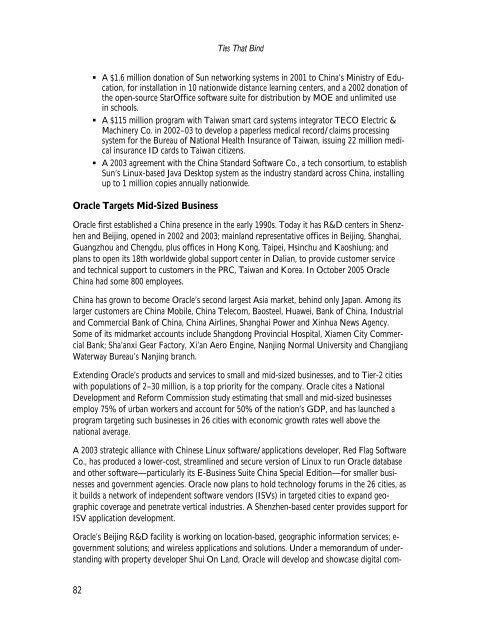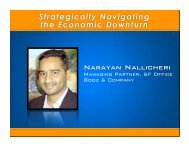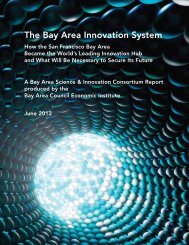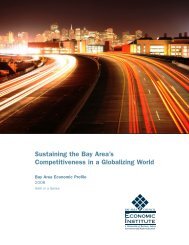Ties That Bind - Bay Area Council Economic Institute
Ties That Bind - Bay Area Council Economic Institute
Ties That Bind - Bay Area Council Economic Institute
Create successful ePaper yourself
Turn your PDF publications into a flip-book with our unique Google optimized e-Paper software.
82<br />
<strong>Ties</strong> <strong>That</strong> <strong>Bind</strong><br />
� A $1.6 million donation of Sun networking systems in 2001 to China’s Ministry of Education,<br />
for installation in 10 nationwide distance learning centers, and a 2002 donation of<br />
the open-source StarOffice software suite for distribution by MOE and unlimited use<br />
in schools.<br />
� A $115 million program with Taiwan smart card systems integrator TECO Electric &<br />
Machinery Co. in 2002–03 to develop a paperless medical record/claims processing<br />
system for the Bureau of National Health Insurance of Taiwan, issuing 22 million medical<br />
insurance ID cards to Taiwan citizens.<br />
� A 2003 agreement with the China Standard Software Co., a tech consortium, to establish<br />
Sun’s Linux-based Java Desktop system as the industry standard across China, installing<br />
up to 1 million copies annually nationwide.<br />
Oracle Targets Mid-Sized Business<br />
Oracle first established a China presence in the early 1990s. Today it has R&D centers in Shenzhen<br />
and Beijing, opened in 2002 and 2003; mainland representative offices in Beijing, Shanghai,<br />
Guangzhou and Chengdu, plus offices in Hong Kong, Taipei, Hsinchu and Kaoshiung; and<br />
plans to open its 18th worldwide global support center in Dalian, to provide customer service<br />
and technical support to customers in the PRC, Taiwan and Korea. In October 2005 Oracle<br />
China had some 800 employees.<br />
China has grown to become Oracle’s second largest Asia market, behind only Japan. Among its<br />
larger customers are China Mobile, China Telecom, Baosteel, Huawei, Bank of China, Industrial<br />
and Commercial Bank of China, China Airlines, Shanghai Power and Xinhua News Agency.<br />
Some of its midmarket accounts include Shangdong Provincial Hospital, Xiamen City Commercial<br />
Bank; Sha’anxi Gear Factory, Xi’an Aero Engine, Nanjing Normal University and Changjiang<br />
Waterway Bureau’s Nanjing branch.<br />
Extending Oracle’s products and services to small and mid-sized businesses, and to Tier-2 cities<br />
with populations of 2–30 million, is a top priority for the company. Oracle cites a National<br />
Development and Reform Commission study estimating that small and mid-sized businesses<br />
employ 75% of urban workers and account for 50% of the nation’s GDP, and has launched a<br />
program targeting such businesses in 26 cities with economic growth rates well above the<br />
national average.<br />
A 2003 strategic alliance with Chinese Linux software/applications developer, Red Flag Software<br />
Co., has produced a lower-cost, streamlined and secure version of Linux to run Oracle database<br />
and other software—particularly its E-Business Suite China Special Edition—for smaller businesses<br />
and government agencies. Oracle now plans to hold technology forums in the 26 cities, as<br />
it builds a network of independent software vendors (ISVs) in targeted cities to expand geographic<br />
coverage and penetrate vertical industries. A Shenzhen-based center provides support for<br />
ISV application development.<br />
Oracle’s Beijing R&D facility is working on location-based, geographic information services; egovernment<br />
solutions; and wireless applications and solutions. Under a memorandum of understanding<br />
with property developer Shui On Land, Oracle will develop and showcase digital com-








